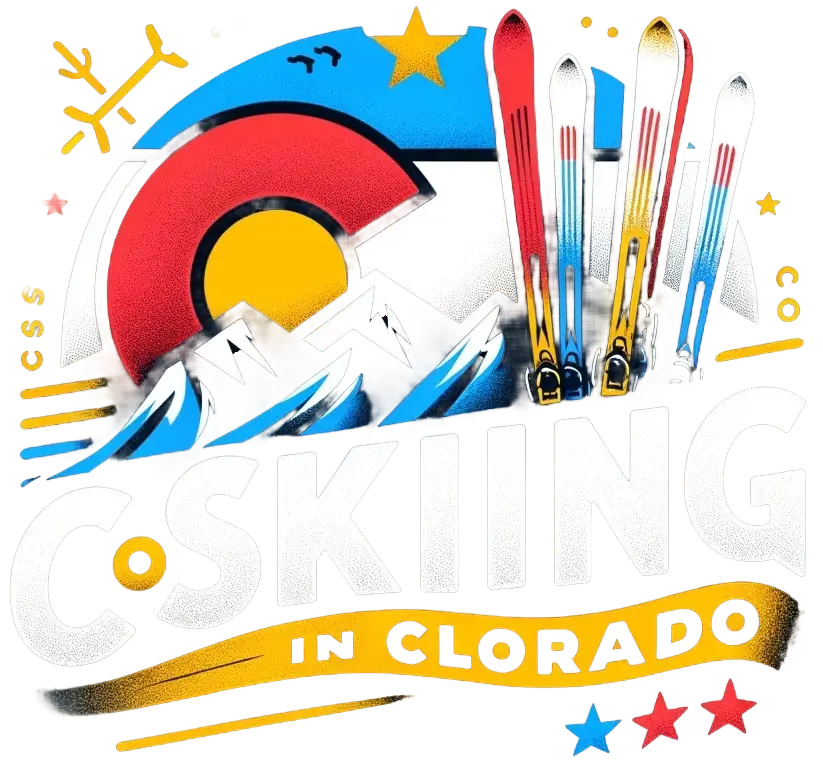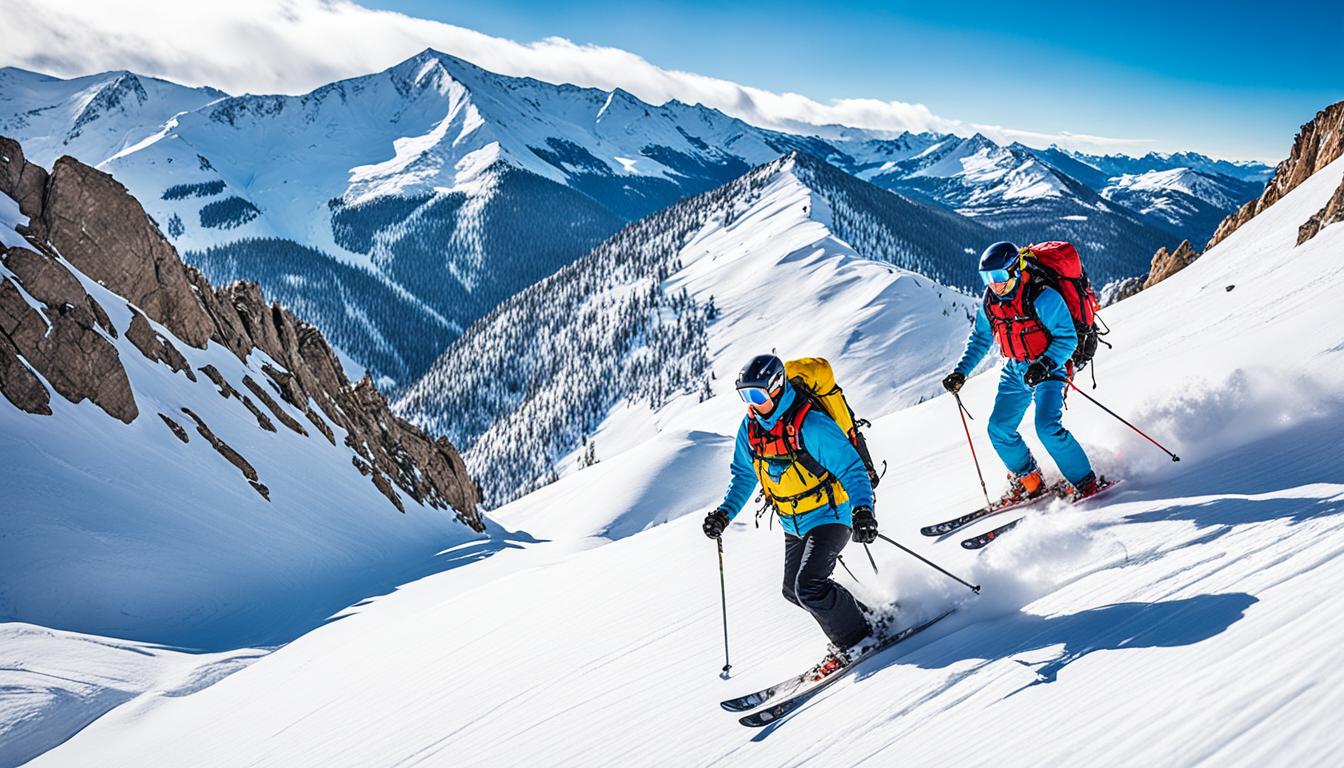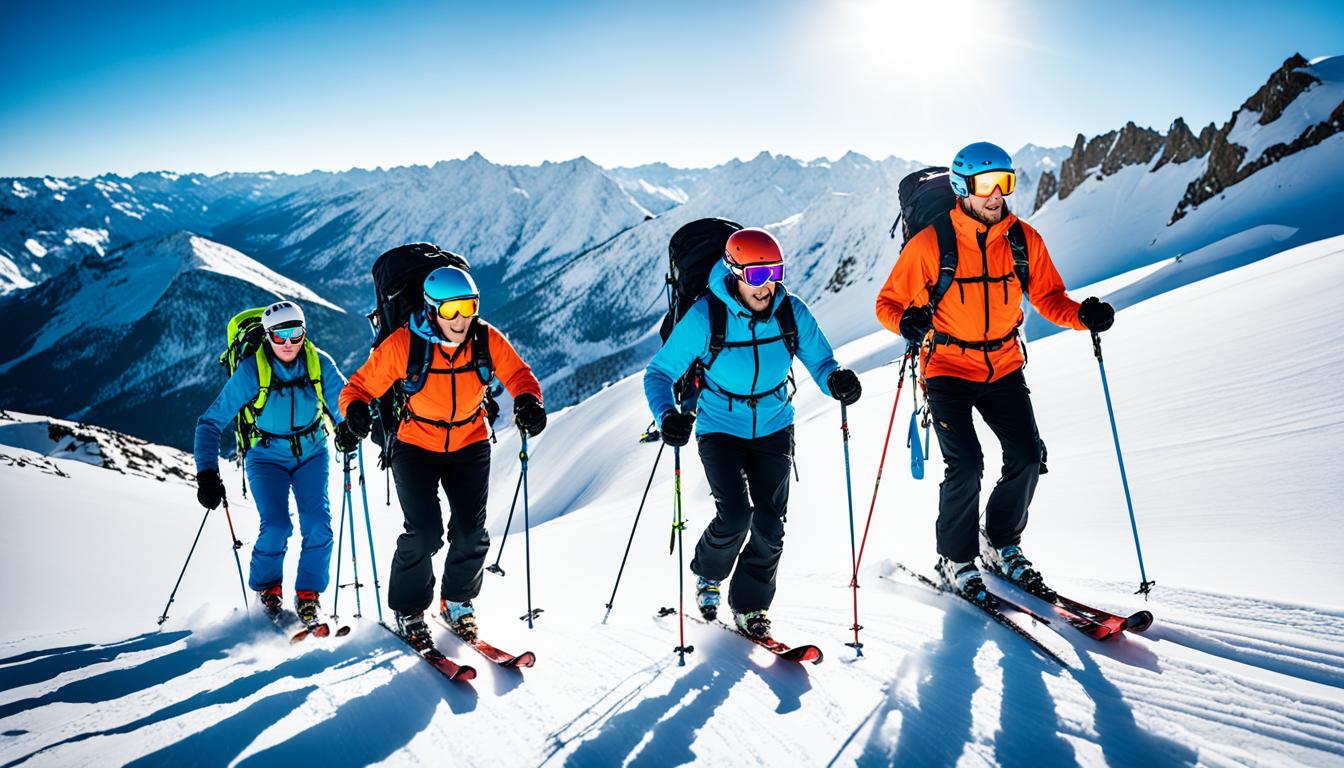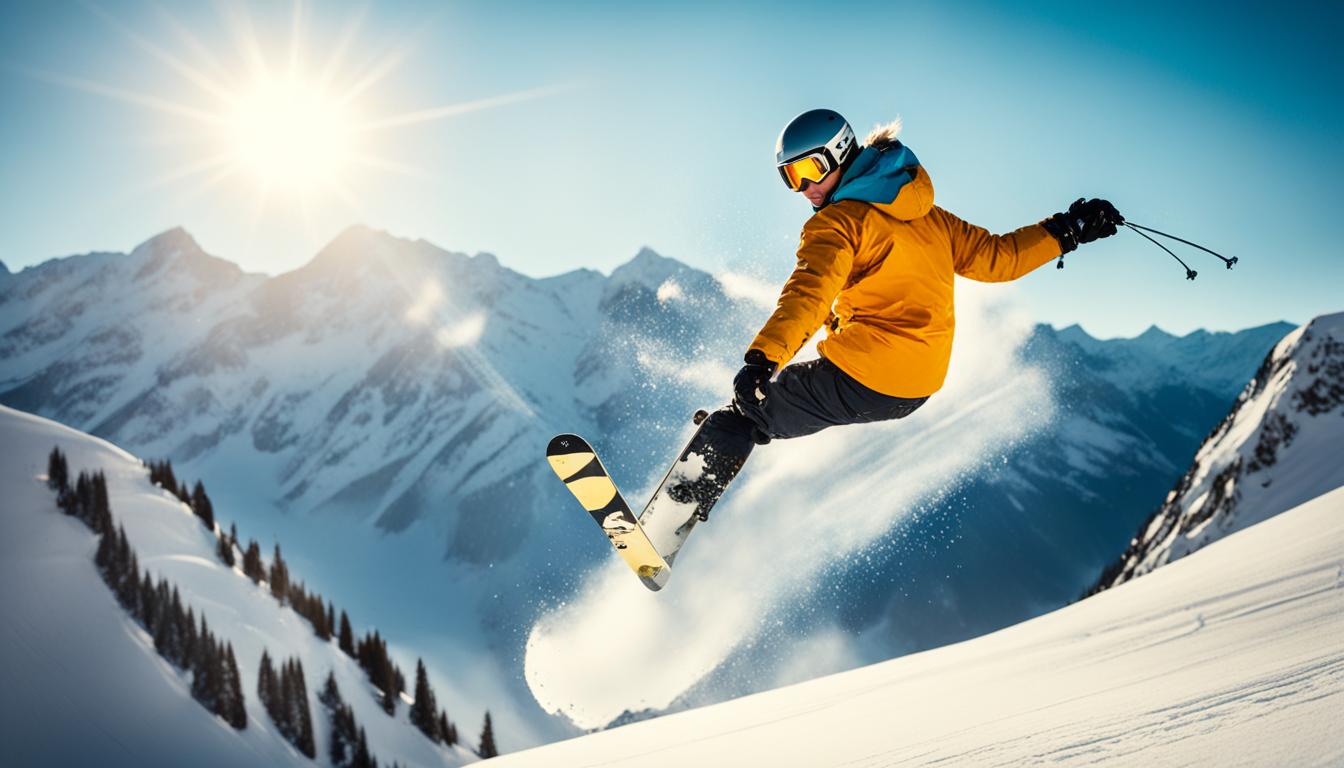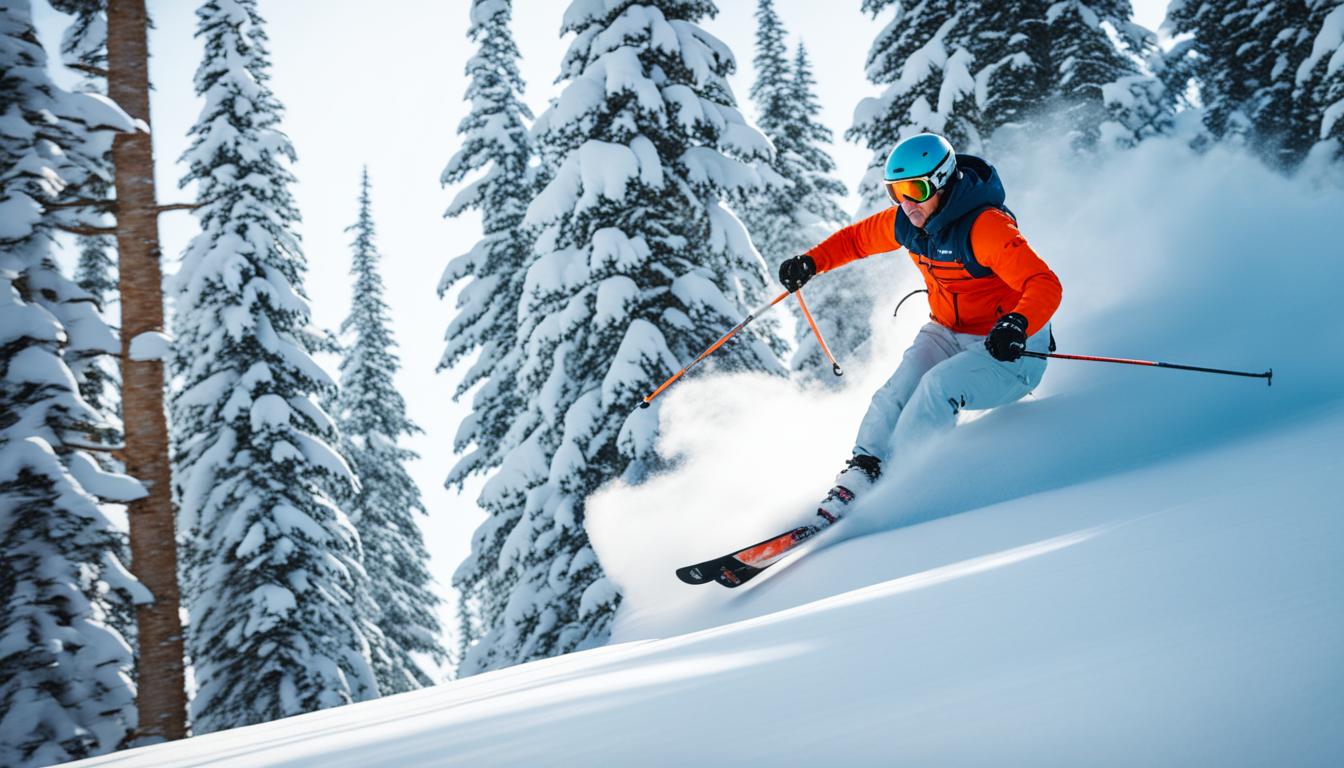Welcome to the rugged and breathtaking backcountry of Colorado! If you’re a ski enthusiast seeking an exhilarating and off-the-beaten-path experience, then you’re in for a treat. In this article, we’ll explore the wonders of off-piste skiing in Colorado, focusing on the famous destination of Aspen and its surrounding areas.
Colorado is a mecca for ski touring and backcountry skiing, offering a multitude of options for all levels of skiers. From pristine powder to challenging terrain, there’s something for everyone here. And when it comes to exploring off-piste, Aspen is hard to beat. Nestled in the heart of the Elk Mountains, this picturesque town is surrounded by towering peaks and endless opportunities for backcountry adventures.
While Aspen is often associated with its glamorous ski resorts and celebrity sightings, its true gem lies in the vast backcountry just beyond the resort boundaries. With intermediate to extreme lines available, skiers of all skill levels can find their perfect playground. The terrain here is as diverse as it is breathtaking, offering glades, bowls, and couloirs to satisfy every adventure-seeking soul.
When it comes to safety, we understand that off-piste skiing requires utmost caution and knowledge. That’s why we’ve compiled essential backcountry skiing safety tips to ensure your journey is both thrilling and secure. From avalanche awareness to proper gear, we’ve got you covered. So strap on your skis and let’s embark on an unforgettable backcountry experience in beautiful Aspen, Colorado!
Key Takeaways:
- Aspen, Colorado offers endless opportunities for off-piste adventures and backcountry skiing.
- The terrain in Aspen caters to skiers of all levels, from beginners to experts.
- Exploring the backcountry requires proper safety precautions, including avalanche awareness and essential gear.
- Hiring a guide can enhance your experience and ensure your safety in the backcountry.
- Aspen is not only a winter destination, but also offers thrilling mountain biking opportunities during the summer months.
Exploring Backcountry Skiing in Aspen
Aspen offers a wide range of backcountry skiing options for powder hounds and beginners alike. The terrain varies, catering to skiers of different levels. Whether you’re a seasoned pro or new to backcountry skiing, Aspen has something for everyone.
For those looking to maximize their experience, Aspen boasts a host of experienced backcountry ski guides. These knowledgeable professionals will help you navigate the best routes and ensure a safe and enjoyable adventure. With their expertise, you can explore the hidden gems of the Aspen backcountry with confidence.
But backcountry skiing isn’t limited to just the winter months. During the summer, Aspen transforms into a mountain biking paradise. With numerous trails suited for all skill levels, mountain bikers can enjoy the thrill and beauty of Aspen’s scenic landscapes.
So whether you’re seeking untouched powder or an adrenaline-fueled mountain biking escapade, Aspen has it all. Experience the best of both worlds in this breathtaking destination.
Where to Stay in Aspen for Backcountry Skiing
While Aspen is known for its world-class ski resorts like Ajax (Aspen Mountain), Aspen Highlands, Buttermilk (Tiehack), and Snowmass, there’s a unique way to experience the true backcountry of Aspen – by staying in backcountry skiing huts. These comfortable and spacious huts are scattered throughout the mountains near Aspen, offering an immersive and adventurous accommodation option for those seeking a deeper connection with nature.
Staying in a backcountry skiing hut provides a fantastic opportunity to wake up surrounded by pristine snow-capped peaks and unspoiled wilderness. Imagine stepping out of your cozy hut and having immediate access to untouched powder and endless backcountry skiing possibilities. Whether you’re a seasoned backcountry skier or just starting, these huts can cater to your needs and provide a memorable experience.
Backcountry skiing huts in Aspen offer a range of amenities to make your stay enjoyable and comfortable. From cozy sleeping quarters and fully equipped kitchens to stunning views and proximity to pristine skiing terrain, these huts have it all. You’ll have the freedom to explore the backcountry at your own pace and return to the serenity of your private mountain retreat at the end of the day.
Staying in a backcountry skiing hut is an excellent choice for families or groups of friends looking to bond over their love of skiing and enjoy the tranquil beauty of the Aspen wilderness. It allows you to disconnect from the hustle and bustle of daily life and immerse yourself in the natural wonders that surround you.
Choosing to stay in a backcountry skiing hut opens up a world of possibilities for exploration. You can plan multiple days of backcountry skiing adventures, exploring different routes and terrain each day. The huts provide a convenient base camp from which you can embark on thrilling ski tours and discover hidden gems in the backcountry near Aspen.
So, if you’re looking for an unforgettable backcountry skiing experience in Aspen, consider staying in one of the backcountry skiing huts. Immerse yourself in nature, enjoy breathtaking views, and have direct access to the backcountry terrain that makes Aspen a paradise for skiers.
Backcountry Skiing for Beginners in Aspen
Aspen welcomes beginners looking to develop their backcountry skiing skills. Whether you’re new to backcountry skiing or just want to test out your new skis, Aspen offers accessible terrain with low avalanche risk, perfect for those starting out.
Sugar Bowls at Buttermilk Mountain
Just beyond the inbound gates at Buttermilk Mountain, you’ll find the Sugar Bowls. This area provides low-angle terrain that is ideal for beginners. With its gentle slopes and low avalanche risk, it offers a safe and enjoyable experience for novice skiers.
Take your time exploring the Sugar Bowls as you gain confidence and develop your technique. It’s the perfect place to hone your backcountry skiing skills before venturing onto more challenging terrain.
Snowmass Resort to Buttermilk via Burnt Mountain
Another mellow tour option for beginner skiers is from Snowmass Resort to the Buttermilk area across Burnt Mountain. This scenic route provides a great opportunity to experience the backcountry while enjoying breathtaking views along the way.
As you make your way across Burnt Mountain, you’ll encounter a variety of terrain that is suitable for beginners. This tour allows you to explore the backcountry at your own pace while taking in the beauty of the Aspen area.
Whether you choose to ski the Sugar Bowls or embark on a tour from Snowmass to Buttermilk, Aspen offers beginner-friendly backcountry skiing options that cater to your skill level and provide a safe and enjoyable experience.
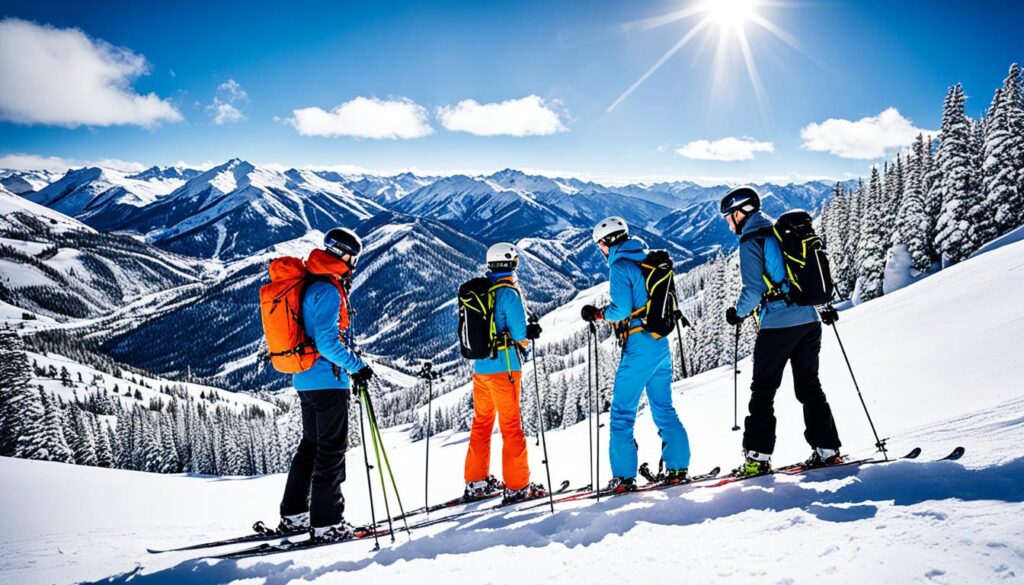
More Challenging Terrain near Aspen
For skiers seeking a thrilling challenge, Aspen offers more than just its renowned slopes. Beyond the resort, there are exciting backcountry options that will push your skills to the next level. Here are a few destinations that will satisfy your hunger for challenging backcountry skiing near Aspen.
Mount Hayden
If you’re up for an adrenaline-pumping adventure, look no further than Mount Hayden. Located just outside of Aspen via Castle Creek Road, this mountain offers a playground for advanced skiers. With its vast bowls and steeper slopes, Mount Hayden provides the perfect terrain for truly challenging backcountry skiing.
Ashcroft
Once a bustling mining town, Ashcroft now serves as a gateway to thrilling backcountry ski trails and huts. Situated near Aspen, this area allows skiers to explore expert-level terrain in the Aspen backcountry. Make sure to pack your sense of adventure and be ready for an unforgettable experience.
Mount Sopris
If you’re searching for steep and narrow couloir skiing, Mount Sopris is the place to be. Located further south of Aspen, this mountain offers expert skiers the opportunity to test their skills on challenging terrain. With breathtaking views and heart-pumping descents, Mount Sopris will leave you in awe of the Aspen backcountry.
Whether you’re conquering the bowls of Mount Hayden, venturing through the backcountry trails of Ashcroft, or tackling the steep couloirs of Mount Sopris, Aspen is a paradise for advanced skiers craving an unforgettable skiing experience.
Remember, backcountry skiing in challenging terrain requires expertise and proper safety precautions. Always check the weather conditions, have the right gear, and consider hiring a professional guide to ensure your safety and enjoyment.
| Mountain | Location | Terrain | Skill Level |
|---|---|---|---|
| Mount Hayden | Just outside of Aspen via Castle Creek Road | Bowls, higher angle descents | Expert |
| Ashcroft | Near Aspen | Backcountry ski trails, huts | Expert |
| Mount Sopris | Further south of Aspen | Steep terrain, couloir skiing | Expert |
Essential Information About Aspen Backcountry Skiing
When it comes to backcountry skiing, Aspen offers a range of terrain that caters to different skill levels and preferences. From high alpine ski-mountaineering adventures to gladed tree runs, there is something for everyone to enjoy. However, it’s important to prioritize safety and be well-prepared before heading out into the backcountry.
You can enhance your Aspen backcountry skiing experience by hiring a guide from Aspen Expeditions. These experienced professionals will not only show you the best routes and hidden gems but also ensure your safety throughout the journey.
Avalanche awareness is paramount when venturing into the backcountry. Familiarize yourself with the local avalanche conditions and make informed decisions based on the current snowpack. Proper gear, including avalanche transceivers, probes, and shovels, should be on your checklist.
“Backcountry skiing is a thrilling experience, but it requires caution and preparation. Always stay informed, make smart decisions, and enjoy the beauty of Aspen’s backcountry safely.”
Backcountry Skiing Safety Tips
To ensure a successful and safe backcountry skiing trip in Aspen, consider the following tips:
- Check the local avalanche forecast before heading out.
- Travel with a reliable group and maintain good communication.
- Carry essential safety gear, including an avalanche beacon, shovel, and probe.
- Stay alert and aware of changing snow conditions.
- Understand and assess the terrain for potential hazards.
- Follow the principles of Leave No Trace and respect the environment.
By following these backcountry skiing safety tips, you can enjoy the breathtaking beauty of Aspen’s backcountry while minimizing risks.
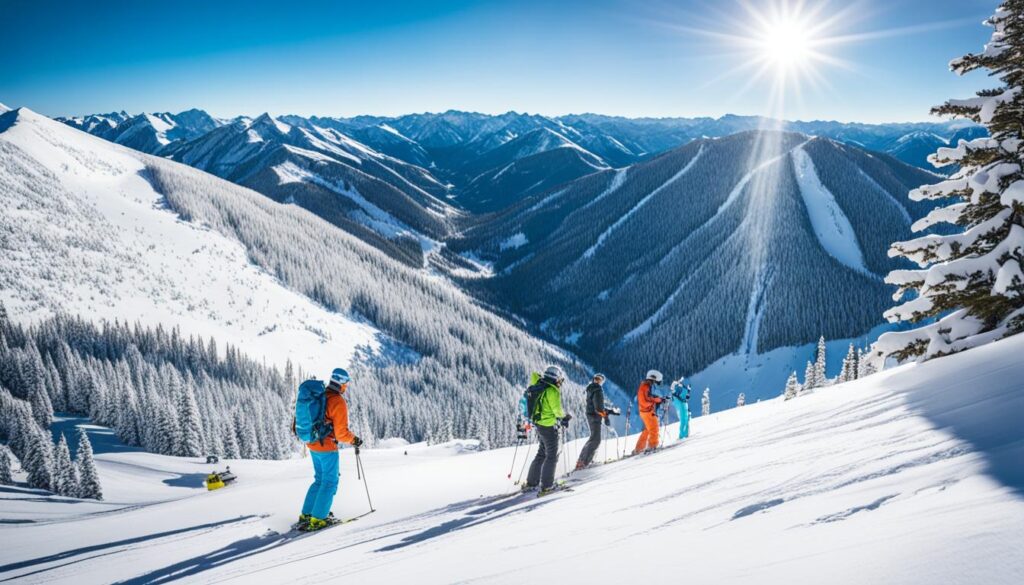
Aspen Backcountry Skiing Gear Checklist
| Item | Description |
|---|---|
| Avalanche Transceiver | A crucial piece of gear that helps locate burials in the event of an avalanche. |
| Avalanche Probe | A long collapsible pole used to locate buried victims in the snow. |
| Avalanche Shovel | Used to dig out a buried victim quickly and efficiently. |
| Touring Skis/Board | Lightweight and specially designed for uphill travel in the backcountry. |
| Touring Bindings | Allowing for easy transitioning between uphill and downhill modes. |
| Touring Boots | Designed for comfort and efficient movement during backcountry skiing. |
| Helmet | Essential for protecting your head in case of a fall or avalanche. |
| Backpack | Carry your gear, extra clothing, and food in a backpack suitable for backcountry skiing. |
| Layered Clothing | Dress in layers to regulate your body temperature as you ascend and descend. |
Other Backcountry Skiing Locations in Colorado
While Aspen is a popular destination for backcountry skiing in Colorado, there are other notable locations worth exploring. Vail Pass, Jones Pass, and Mayflower Gulch offer scenic and accessible backcountry skiing experiences. These areas provide options for skiers of different skill levels, with a focus on mellow terrain that is ideal for a good workout in stunning scenery.
At Vail Pass, skiers can enjoy a mix of open slopes and tree runs, with breathtaking views of the surrounding peaks. With easy access from Interstate 70, Vail Pass is a convenient choice for a day trip or a longer ski excursion.
Jones Pass, located just west of Berthoud Pass, offers a wide variety of backcountry skiing options. From gentle slopes to challenging couloirs, there is something for everyone at Jones Pass. The area is known for its abundant snowfall and stunning alpine scenery.
Mayflower Gulch, located near Copper Mountain, is a hidden gem for backcountry skiing enthusiasts. The area features gentle slopes and glades, making it perfect for skiers looking for a more relaxed experience. The picturesque scenery of Mayflower Gulch adds to the allure of this backcountry skiing location.
Vail Pass Backcountry Skiing Map
| Location | Difficulty | Highlights |
|---|---|---|
| Vail Pass | Easy to Intermediate | – Wide open slopes – Tree runs – Scenic views |
| Jones Pass | Intermediate to Advanced | – Abundant snowfall – Challenging couloirs – Alpine scenery |
| Mayflower Gulch | Easy to Intermediate | – Gentle slopes – Glades – Picturesque scenery |
Conclusion
Exploring the backcountry in Colorado safely is a thrilling adventure for skiing enthusiasts. Whether you choose to ski in Aspen or other locations across the state, it’s important to prioritize safety and take the necessary precautions. As you venture off-piste, make sure to equip yourself with proper avalanche gear, such as a beacon, shovel, and probe. Having a good understanding of avalanche awareness is essential in assessing the risks and making informed decisions.
Consider hiring a knowledgeable backcountry skiing guide who can provide valuable insights and enhance your experience. They can help you navigate the terrain, offer expertise in route selection, and ensure that you’re skiing in safer areas. Additionally, investing in the right off-piste skiing gear, such as touring skis, bindings, and skins, can greatly enhance your performance and safety in the backcountry.
Winter backcountry safety is paramount. Before setting out, be sure to check the current avalanche forecast and weather conditions. Stay informed about the snowpack and any potential hazards that may affect your skiing experience. Remember, winter backcountry conditions can change rapidly, so it’s crucial to be flexible and adaptable during your journey.
By following these backcountry skiing safety tips and being prepared with the right gear and knowledge, you can have a rewarding and unforgettable adventure exploring off-piste in Colorado. Stay safe, enjoy the breathtaking scenery, and make unforgettable memories as you carve your own path in the winter backcountry.
FAQ
What is backcountry skiing?
Backcountry skiing refers to skiing in undeveloped and unpatrolled terrain typically outside of ski resorts. It involves skiing on natural snow, away from groomed runs, and often requires hiking or ski touring to reach the desired area.
Is backcountry skiing dangerous?
Backcountry skiing does come with inherent risks, especially when it comes to avalanches. However, with proper knowledge, training, and equipment, these risks can be minimized. It is essential to be aware of avalanche conditions, practice avalanche safety protocols, and have the necessary equipment such as avalanche beacons, shovels, and probes.
Do I need a guide for backcountry skiing?
While it is not mandatory to hire a guide, it is highly recommended, especially for those who are new to backcountry skiing or unfamiliar with the area. A guide can provide valuable expertise, help navigate the terrain, and ensure a safer and more enjoyable experience.
What gear do I need for backcountry skiing?
Essential gear for backcountry skiing includes skis or a splitboard, climbing skins, ski boots, avalanche safety equipment (beacon, shovel, and probe), warm clothing layers, a backpack, and plenty of water and snacks. It is also crucial to have a helmet and a first aid kit.
How can I assess avalanche risk?
Assessing avalanche risk involves considering factors such as recent weather, snowpack stability, and slope angle. It is crucial to gather information from avalanche forecasts, terrain observations, and local experts before venturing into the backcountry. Taking an avalanche education course can also help develop the necessary skills to assess avalanche risk effectively.
Can I go backcountry skiing alone?
While it is possible to go backcountry skiing alone, it is not recommended, especially for beginners or those unfamiliar with the area. Having a partner or joining a guided tour enhances safety as there is someone to assist in case of an emergency or accident.
How physically fit do I need to be for backcountry skiing?
Backcountry skiing can be physically demanding, especially when hiking or skinning uphill. It is recommended to have a reasonable level of fitness and be comfortable with endurance activities. Regular exercise and preparation, such as cardiovascular training and strength exercises, can help improve overall fitness for backcountry skiing.
What are the avalanche forecasts like in Colorado?
Avalanche forecasts in Colorado are crucial for backcountry skiing. The Colorado Avalanche Information Center (CAIC) provides daily forecasts for different regions within the state. These forecasts include information about avalanche danger, snowpack stability, and weather conditions. It is essential to check the forecasts before heading into the backcountry.
